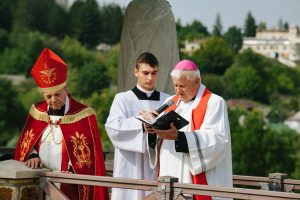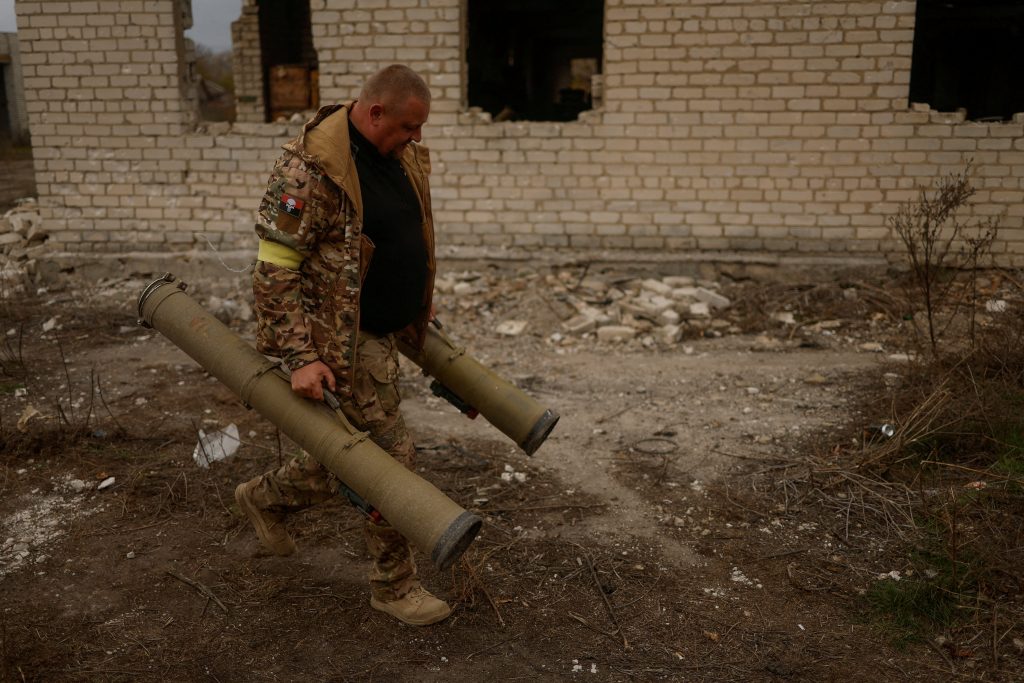WARSAW, Poland (CNS) -- The Latin-rite bishop whose diocese includes Kherson, Ukraine, accused Russian forces of "cruel and bestial behavior" in the recaptured port and warned his country would not negotiate with Moscow until all occupied territory is regained.
"All the methods used by Soviet paramilitary police have returned with the Russian occupiers -- the cruel and bestial behavior is absolutely unchanged," said Bishop Stanislav Szyrokoradiuk of Odesa-Simferopol.
"Although pressure is now being exerted on us to negotiate and cede territory, our government and armed services won't agree to this. We've already struggled and suffered too much, while everyone knows any concessions will merely fuel further demands."
In a Nov. 15 interview with Catholic News Service, Bishop Szyrokoradiuk said destruction of Kherson's infrastructure had left local Catholics without water or lighting. He said many citizens were helping Ukrainian troops clear wrecked masonry and trees from the city that Russian troops abandoned in early November after an eight-month occupation.
He added that the Kherson's Sacred Heart Parish was lucky to have its own generator and had received a busload of food and medicine from the diocese. Parish staff would hand it out to needy residents, he said.
"The whole situation is tragic -- most people have nothing at all, while communication links are also down since cables, modems and satellite dishes were all ripped apart to allow only Russian TV and radio," Bishop Szyrokoradiuk told CNS.
"It's dangerous to travel outside designated routes, since the roads are heavily mined. While many ordinary people fled Kherson at the outset, fearing it would be bombarded and destroyed, many were later tricked into leaving or forcibly deported, including huge numbers of children from the city's orphanages. But most parishioners have stayed, and we're doing what we can for them."
The loss of Kherson, the only regional capital captured by Russia after its Feb. 24 invasion, is seen as a major blow to Russian President Vladimir Putin, whose forces still occupy parts of the Donetsk, Luhansk and Zaporizhzhia regions that Russia declared annexed in late September.
Visiting Kherson Nov. 14, Ukrainian President Volodymyr Zelenskyy said Russian troops had systematically destroyed critical infrastructure and mined "all important objects" before Ukrainian forces entered Kherson Nov. 11.

Bishop Szyrokoradiuk said diocesan headquarters in Odesa had been made safer by the fall of Kherson, with energy supplies still largely intact. He said most incoming Russian missiles and drones were shot down before reaching targets in port and residential areas.
"In the villages and towns, however, it's a different story -- whenever they (Russians) arrived, they assembled people, separating families and taking people away, something we're reminded of in the many unmarked graves now being discovered," the bishop told CNS.
"Our army believes it is fighting terrorists, who shell and bomb civilians, beating and killing peoples in their homes. In such conditions, when everything has been profaned and ruined and all agreements ignored on Putin's orders, how can we respect anything he says? Our only option is to deal with these people once for all and stop them spreading terror among innocent people."
The bishop said several Catholic churches in the Kherson region had been damaged or destroyed, but added that he had not heard of deaths or injuries among local Catholics.
He said clergy from Kherson's Protestant and independent Orthodox communities had fled, fearing Russian reprisals, and said Catholic priests who remained in the region had been constantly watched and threatened by occupation troops. The priests preached "only very short, careful homilies" at Masses, he said.
"We're now praying and hoping the Russians don't come back, that God will help us survive these terrible injustices -- but there are many uncertainties," Bishop Szyrokoradiuk told CNS.
"Putin's Russia should be seen and understood in the same way as Nazi Germany under Hitler -- the situation is the same now as it was then, making negotiations impossible. When they (Russians) occupied Crimea and the Donbas in 2014, we were advised to accept this as the price for peace. But it wasn't the end and they later demanded more -- and it would be just the same now, as they regroup forces to strike us again. Long-term peace and order will only return once these murderers are placed before an international criminal court."
The rector of Kherson's Sacred Heart Parish, Father Maxim Padlevsky, told CNS Nov. 14 that conditions for Catholics were the same as for other city inhabitants, with gas and drinking water cut off and all normal life disrupted.
He added that he had returned to the occupied city in August, after several months' refuge in western Ukraine, and said information was being collected and shared by fearful parishioners as they "try to find out what's happening."

